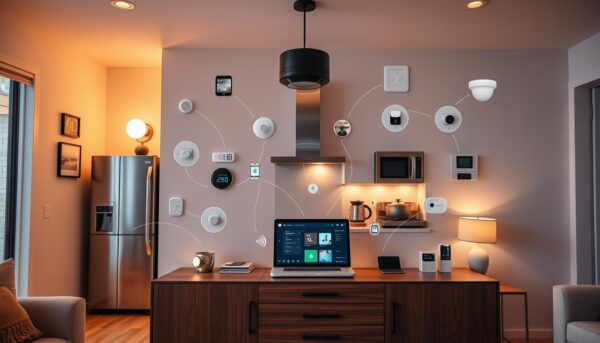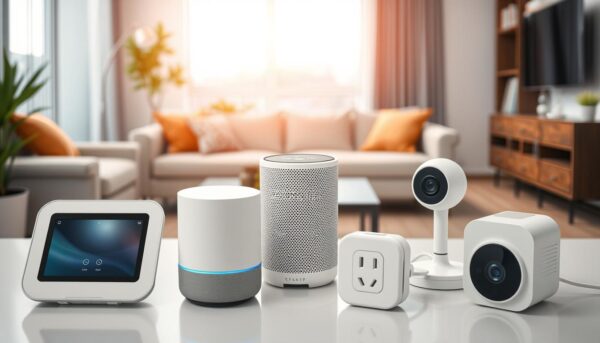✅ Last checked on
Ever felt like managing your smart devices is a juggling act? The right smart home hub could change that. Today, a smart home hub is like your home’s control center. It connects everything from lights to locks.
With so many devices in our homes, picking the best smart home hub is key. It makes your life easier and more automated. By choosing wisely, you can make your home work better for you.
Key Takeaways
- Choosing the right smart home hub can simplify your device management.
- Smart home hubs can significantly enhance your home automation experience.
- Multi-protocol hubs support various connection types for enhanced compatibility.
- Many smart homes with multiple devices benefit from having a dedicated hub.
- Understanding the different types of smart home hubs is essential for making an informed choice.
What is a Smart Home Hub?
A smart home hub is like the brain of your smart home. It gives you centralized control over many devices. You can manage things like security systems, lights, locks, and cameras all from one place.
These hubs use smart home automation protocols like Zigbee, Z-Wave, and Matter. This lets devices talk to each other smoothly. It makes it easy to set up complex automation routines.
Smart home hubs come in two types: wired and wireless. Wired options include DALI and KNX, while wireless ones use Z-Wave and Zigbee. Each has its own benefits, like better power use or connectivity.
For example, Z-Wave works with over 3,000 devices, and Zigbee supports about 2,500. This means you can pick the right devices for your smart home.
One big plus of smart home hubs is they help avoid network problems. They keep your Wi-Fi or Bluetooth free from traffic. This makes sure your devices work well.
It’s also important to keep your smart home safe. Make sure to update your hub regularly and change default passwords. This helps protect against security threats.
| Key Features | Examples | Protocols Supported |
|---|---|---|
| Device Compatibility | Samsung SmartThings Hub | Z-Wave, Zigbee, Wi-Fi |
| Wireless Control | Logitech Harmony Hub | IR, Wi-Fi, Bluetooth |
| Hybrid Functionality | TP-Link Deco M9 Plus | Wi-Fi, Z-Wave, Zigbee |
| Security Integration | Abode Home Security Kit | Z-Wave, Wi-Fi |
Using a smart home hub makes managing your devices easier. It adds advanced features and boosts your home’s efficiency. Whether you want a fully smart home or just to improve your current setup, a smart home hub is a great choice.
Benefits of Using a Smart Home Hub
Using a smart home hub can change your home for the better. It makes life easier by controlling all your devices from one app. This means no more switching between apps.

Smart home hubs like SmartThings and Hubitat work with Amazon Alexa and Google Assistant. They let you create scenes and routines that fit your life. You can also control your devices from anywhere, giving you peace of mind when you’re not home.
These hubs also make your home entertainment better. They help you control lighting for movie nights or family gatherings. They even track your sleep and give health tips, helping you live healthier.
Getting a smart home hub can also make your home more valuable. It adds features like child and pet monitoring, smart appliance integration, and automated home office systems. Plus, updates keep your hub current and ready for the future.
Accessibility is a big plus, too. These hubs work well for people with disabilities or limited mobility, thanks to voice control and remote access. Using smart home tech also helps the environment and keeps you safe and calm.
Different Types of Smart Home Hubs
Smart home hubs come in two main types: multi-protocol hubs and ecosystem hubs. Knowing the difference helps you pick the right one for your home.
A multi-protocol hub works with many communication protocols. This lets you connect a wide range of devices from different systems. It also offers local control, making your devices work even without the internet.
An ecosystem hub, however, is made for specific systems like Amazon Echo and Google Home. These hubs work best with devices from the same brand. They offer a smooth experience for users in one ecosystem.

Matter is a new standard in the smart home world. It makes devices from different brands work together easily. Many hubs now support both multi-protocol and ecosystem functions.
Deciding between these types depends on your needs and devices. For wide compatibility, choose a multi-protocol hub. If you’re all in on one system, an ecosystem hub is the way to go.
Best Smart Home Hubs for Your Needs
Choosing the right smart home hub is key to a seamless experience. It’s important to think about what you need before making a choice. Here’s a look at some top hubs for different needs.
Best Overall Smart Home Hub: The Amazon Echo (4th Gen) stands out for its versatility. It supports Wi-Fi, Bluetooth, and Zigbee, making it great for many devices. Its easy setup and voice commands make it a favorite for many.
Best SmartThings Hub: The Aeotec Smart Home Hub is priced at $129.99. It offers the same features as the original SmartThings and supports more devices. It’s perfect for those already using SmartThings.
Best Budget-Friendly Hub: For those on a tight budget, the Amazon Echo Dot (Gen 5) is a great choice. At just $49.99, it’s easy to start with smart home automation. It works well with Bluetooth and Wi-Fi devices.
| Hub | Price | Protocols Supported | Best For |
|---|---|---|---|
| Amazon Echo (4th Gen) | $100 | Wi-Fi, Bluetooth, Zigbee | Overall usage |
| Aeotec Smart Home Hub | $129.99 | Zigbee, Wi-Fi | SmartThings users |
| Amazon Echo Dot (Gen 5) | $49.99 | Wi-Fi, Bluetooth | Budget needs |
| Apple HomePod mini | $99.99 | Wi-Fi, Bluetooth | HomeKit users |
| Google Nest Hub (Gen 2) | $99.99 | Wi-Fi, Bluetooth | Google ecosystem |
Choosing the best smart home hub depends on your needs and devices. Make sure to check compatibility for a smooth experience. By comparing options and reading top hubs comparison, you can find the perfect fit for your home.
Key Features to Look For in a Smart Home Hub
When choosing a smart hub, it’s key to look at several important features. These features help your smart home work well. Here are some essential smart home hub features to consider:
- Voice Automation: Being able to use voice assistants like Alexa and Google Assistant makes controlling your home easy. It adds a lot of convenience.
- Device-to-Device Connectivity: A good hub should let devices talk to each other. This means one device can start another’s action. It makes your home work together smoothly.
- Ease of Use: A hub that’s easy to use and has a simple app is best. It should make setting up and managing devices easy. This makes your smart home experience better.
Knowing about these essential hub functionalities helps you find the right device. The right hub makes using your smart devices better. It helps create a more advanced home.
| Smart Home Hub | Price Range | Device Support | Wireless Standards |
|---|---|---|---|
| Amazon Echo (4th Generation) | Over $100 | Up to 5,000 | Zigbee 3.0, WiFi |
| Aeotec Smart Home Hub | Over $100 | Up to 5,000 | Z-Wave 700, WiFi |
| Google Nest Hub (2nd Generation) | Over $100 | Varied | WiFi |
| Apple HomePod mini | Over $100 | Varied | Thread, WiFi |
| Brilliant All-in-One Smart Home Control | About $350 | Varied | Zigbee 3.0, WiFi |
Understanding these features is key to choosing the right smart hub. Whether you want more control, better connectivity, or simplicity, focusing on these features is important. It ensures your smart home works well and fits your lifestyle.
How to Choose the Right Smart Home Hub for You
Choosing the right smart home hub can seem daunting at first. But, a few key points can help guide you. Start by thinking about the devices you already own. It’s important to know if they use Wi-Fi, Zigbee, or Z-Wave. This affects how well your hub will work.
Also, think about any new devices you might add in the future. This will help you pick a hub that can handle them.
Consider the ecosystem compatibility of your hub. Look for one that works well with Amazon Alexa, Apple HomeKit, or Google Home. This makes controlling your home with your voice easier and more convenient.
Think about how you want to control your home. Do you need a simple setup, or do you want advanced features? Features like scheduling, scene creation, and triggers can give you more control over your devices.
Look at the hub’s scalability. As your smart home grows, you’ll need a hub that can easily add new devices. Also, don’t overlook security. Choose a hub with strong encryption, secure login, and regular updates to keep your home safe.
Finally, think about your budget. There are many options, from the Ikea Dirigera to the Samsung SmartThings Station. Each has its own strengths. Make sure you pick the best hub for your needs and budget.
Conclusion
A smart home hub is key for anyone wanting to improve their smart home. It makes controlling and automating your home easy. You can choose from many options, from simple to complex, to fit your needs.
Using a smart home hub brings many benefits. It makes your life easier, keeps your home safe, and manages your devices well. Knowing the latest in smart home hubs helps you make smart choices. This leads to a more connected and smart home.
Knowing what you need helps you pick the right hub. It should meet your current needs and grow with your smart home. Choose wisely today for a future-ready home with a smart home hub.